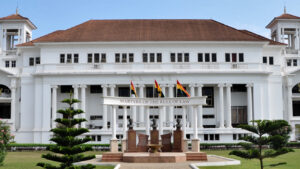Government Boosts Market Confidence with GH¢9.7 Billion Payout to Bondholders Under Debt Restructuring Plan

The Government of Ghana has injected nearly GH¢9.7 billion into the economy through a major coupon payment under the Domestic Debt Exchange Programme (DDEP), reinforcing its pledge to restore fiscal stability and rebuild trust in the financial system.
In a statement released by the Ministry of Finance, officials confirmed that a total of GH¢9,698,815,220.17 was paid to bondholders on Tuesday, as part of ongoing commitments under the DDEP. This latest disbursement brings the total amount paid to bondholders in 2025 alone to approximately GH¢19.4 billion — a significant financial undertaking that government sources say is aimed at demonstrating credibility and long-term fiscal responsibility.
According to the Ministry, the payment is far more than a routine financial obligation. It represents a deliberate move to reassure investors, financial institutions, and the broader public that the government is committed to meeting its debt obligations fully and on time, despite recent economic challenges. The Ministry described the transaction as a clear signal of government’s intention to rebuild confidence and support economic recovery.
As part of its broader debt management strategy, the government has also introduced two new financial mechanisms: a Cedi Sinking Fund and a US Dollar Sinking Fund. These funds are specifically designed to accumulate reserves for the repayment of bonds maturing in the years 2026, 2027, and 2028. Officials say the creation of these dedicated funds will provide an added layer of financial security and ensure the sustainability of future debt service commitments.
“This payment shows our unwavering commitment to meeting our obligations on time,” the Ministry noted, adding that all future obligations, including those arising under the DDEP, will be honoured in full and without delay.
The DDEP, first introduced in 2022, was launched as a key pillar of Ghana’s broader economic recovery framework in response to mounting debt levels and macroeconomic instability. The programme, which involved exchanging old bonds for new ones under revised terms, drew mixed reactions from stakeholders — with some praising its long-term benefits and others expressing concern about the short-term impact on investors.
However, the latest GH¢9.7 billion payout is being viewed by many analysts as a bold and credible step forward. It not only addresses immediate investor concerns but also reaffirms the government’s commitment to transparent and responsible debt management.
Market watchers believe this move could play a vital role in restoring investor confidence, stabilizing the financial markets, and attracting new capital into the economy. For ordinary Ghanaians, the announcement may also offer a sense of reassurance that the country’s economic path, though difficult, is being managed with a renewed sense of discipline and accountability.






